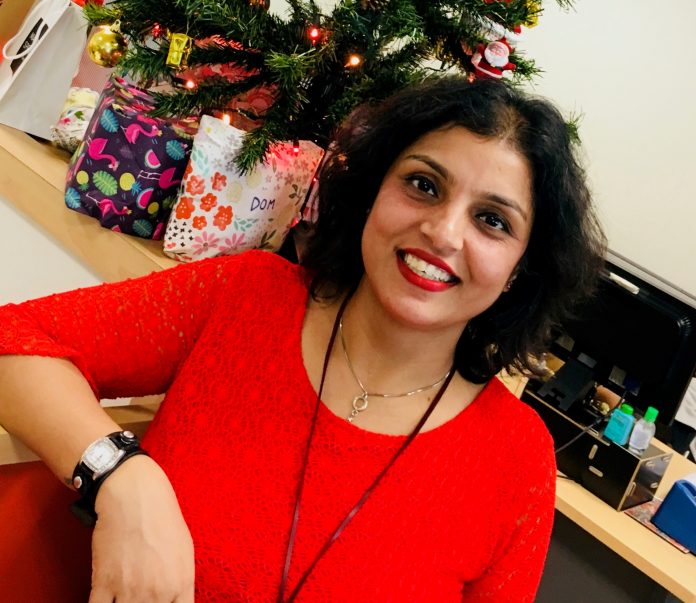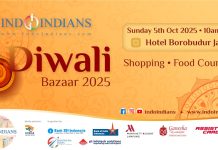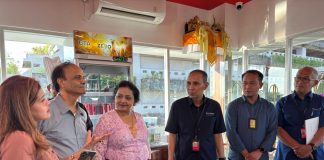Dr Sanjukta Choudhury-Kaul, BINUS INTERNATIONAL
on People with Disabilities and the New Normal
BINUS UNIVERSITY is an AACSB-accredited university and its international campus in Jakarta, BINUS INTERNATIONAL, is well known for its contemporary business, computing, design, and communication courses. BINUS finds engaging with difference important in the development of the skills for the global market.
Dr Sanjukta Choudhury-Kaul is a full-time international faculty member with the International Business program of BINUS BUSINESS SCHOOL, at BINUS INTERNATIONAL. She has been with BINUS since 2015, and teaches undergraduate, master’s and executive programs on Business Ethics, Leadership and ASEAN Business. Her research interests are in the area of disability in the workplace, gender and micro-entrepreneurship. Sanjukta has a Ph.D. from Monash Business School, Australia and a master’s from Nottingham Business School, U.K. She is also a British Chevening Scholar and Erasmus Teaching Fellow.
She has two decades of experience as an industry professional and academic in the field of diversity and marginalized issues. Dr Choudhury-Kaul recently offered a lecture on ‘People with Disabilities and the New Normal’ at the Nationwide University Network in Indonesia, under the International Lecture Series co-hosted by BINUS UNIVERSITY. Here are some of the highlights of her session.
What did the onset of the pandemic mean for people with disabilities (PwD)?
The lockdown began in the middle of March 2020 in Indonesia. We were starting to work from home or arriving in our offices wearing masks. For me, as a person who is severely bi-senso neurally hearing impaired and relies on lip reading and extensive non-verbal communication, this became an instant nightmare. How am I going to read people’s faces? I was Googling for solutions on how people with disabilities plan to adapt and work during the pandemic. I was not able to find anything. Eventually, I came upon a picture of a girl who was making masks with a transparent mouthpiece. Local versions are available on Tokopedia now, however, the price is much higher compared with a normal mask at about IDR 150,000. So, most people with disabilities had to overcome an initial feeling of panic when COVID-19 struck, indicating potential immediate loss of economic and social support.
For varying types of disability, the response of PwD has been different. For me as an academic, with the whole education world moving to Zoom, the pandemic meant a lot more ear pressure and fatigue. For my friends who are visually impaired or have mental health concerns, and whose interactions are based on external support and assistance dogs, the pandemic created both domestic and professional challenges.
What is our current perception of disability?
Most of us understand disability from the historical perspective. Much of this historical approach to disability focuses on inability, not ability. The latter is a new concept. In most religions, for instance, people with disabilities emerge as recipients of miracle healings, where they are cured back into being ‘normal’. There is also a perception of PwD as a source of inspiration or motivation. Of course, with all the disability movements and awareness, perceptions have changed towards more inclusion, but we still have a long way to go.
What are some of the challenges people with disabilities are facing today?
Most PwD are economically marginalized – they are not mainstream. I remain conscious that I am a privileged person with a disability having the opportunity to work in the higher education sector. For me to pay my own tax helps validate my identity – that I am not depending on anybody. But most people with disabilities live on the fringes, especially in the rural sector. In Indonesia, for instance, people with disabilities are generally an ‘invisible population’. I rarely meet people who are disabled in shopping malls, and restaurants, interestingly, despite all these facilities being accessible. You simply don’t see these people going out and socializing. There are also many other challenges – socio-political exclusion, access to education, technological alienation, independent living and travelling amongst others.
How did COVID-19 specifically impact people with disabilities?
We have little research so far. But people with disabilities are definitely a high-risk category during the pandemic. Thinking only from the perspective of health care, people with disabilities who rely on medical services are at risk of losing necessary access. Timely information is another challenge. My friends with visual impairments are facing large challenges because so much information is released, but the websites are not audible. The pandemic has forced people indoors, into closed spaces, so women and girls with disabilities are at an increased risk of violence. 91% of people with disabilities also reported increased expenses in one recent study.
How did COVID-19 impact you as a lecturer? What support did you receive at your workplace?
The nature of the job for people with disabilities has in many ways changed completely. Working from home means flexibility in many ways, but this experience will vary widely depending on the type of disability and the domestic and socio-economic realities.
My workplace is very supportive of my adaptation needs. At BINUS INTERNATIONAL, my classrooms are all accessible which allows me to interact with my students, manage my disability and achieve high teaching and learning scores.
How can we ensure more inclusion for people with disabilities during the COVID-19 pandemic?
Good examples come from around the world. The United Arab Emirates launched a national program to test people with disabilities in their homes. In the Philippines, the Commission on Human Rights has published information to support health agencies to tailor public messages for vulnerable groups. In Canada, the COVID-19 Disability Advisory Group was established with the participation of PwD to advise the government on disability-specific issues. It is important to distinguish between individual rights and charity making sure supportive policies are implemented. It is also exceptionally important that we as individuals diversify our circle of friends to include people from different backgrounds – this will not only help inclusion but help everyone to enrich their perspectives.
Interested in joining BINUS?
Take a look at BINUS INTERNATIONAL website via https://bit.ly/binusintl.
You can also contact global@binus.edu for more information on programs and employment opportunities.






